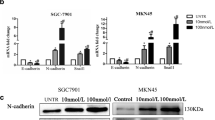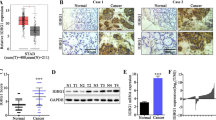Abstract
Epithelial-mesenchymal transition (EMT) plays an important role in metastasis of gastric cancer. Our previous study showed that Gastrokine-2 (GKN2) can inhibit the metastasis of SGC-7901 and AGS cells. Herein, we further explored the role of GKN2 in epithelial mesenchymal transition of gastric cancer cells and the underlying mechanisms. We found that overexpression of GKN2 can lower the protein expression level of Snail and markedly elevate E-cadherin protein level in SGC7901 and AGS cells. Further data showed that knockdown of snail can inhibit the migration and invasion of SGC-7901 and AGS cells. It is known that Snail can be phosphorylated by GSK3β, a downstream protein of PI3K/AKT pathway. We then test protein expression of p-GSK3β(Ser-9), the downstream protein of PI3K/AKT, which was significantly decreased under the circumstance of GKN2 overexpression. Moreover, LY294002, a PI3K inhibitor, can reverse the protein expression change of E-cadherin and snail induced by siGKN2. Taken together, these findings suggested that GKN2 suppressed epithelial mesenchymal transition of gastric cancer cells by downregulation of snail through PI3K/AKT/GSK3β signaling pathway.




Similar content being viewed by others
References
Lordick F et al. Unmet needs and challenges in gastric cancer: the way forward. Cancer Treat Rev. 2014;40:692–700.
Jemal A et al. Global cancer statistics. CA Cancer J Clin. 2011;61:69–90.
Mehlen P, Puisieux A. Metastasis: a question of life or death. Nat Rev Cancer. 2006;6:449–58.
Guarino M, Rubino B, Ballabio G. The role of epithelial-mesenchymal transition in cancer pathology. Pathology. 2007;39:305–18.
Bernards R, Weinberg RA. A progression puzzle. Nature. 2002;418:823.
Thiery JP. Epithelial-mesenchymal transitions in tumour progression. Nat Rev Cancer. 2002;2:442–54.
Polyak K, Weinberg RA. Transitions between epithelial and mesenchymal states: acquisition of malignant and stem cell traits. Nat Rev Cancer. 2009;9:265–73.
Le Bras GF, Taubenslag KJ, Andl CD. The regulation of cell-cell adhesion during epithelial-mesenchymal transition, motility and tumor progression. Cell Adh Migr. 2012;6:365–73.
Thiery JP. Epithelial-mesenchymal transitions in cancer onset and progression. Bull Acad Natl Med. 2009;193:1969–78. 1978-9.
Peinado H, Olmeda D, Cano A. Snail, Zeb and bHLH factors in tumour progression: an alliance against the epithelial phenotype? Nat Rev Cancer. 2007;7:415–28.
Hedlund J, Johansson J, Persson B. BRICHOS - a superfamily of multidomain proteins with diverse functions. BMC Res Notes. 2009;2:180.
Menheniott TR, Kurklu B, Giraud AS. Gastrokines: stomach-specific proteins with putative homeostatic and tumor suppressor roles. Am J Physiol Gastrointest Liver Physiol. 2013;304:109–21.
Moss SF et al. Decreased expression of gastrokine 1 and the trefoil factor interacting protein TFIZ1/GKN2 in gastric cancer: influence of tumor histology and relationship to prognosis. Clin Cancer Res. 2008;14:4161–7.
Dai J et al. Gastrokine-2 is downregulated in gastric cancer and its restoration suppresses gastric tumorigenesis and cancer metastasis. Tumour Biol. 2014;35:4199–207.
Westley BR, Griffin SM, May FE. Interaction between TFF1, a gastric tumor suppressor trefoil protein, and TFIZ1, a brichos domain-containing protein with homology to SP-C. Biochemistry. 2005;44:7967–75.
Resnick MB et al. Global analysis of the human gastric epithelial transcriptome altered by Helicobacter pylori eradication in vivo. Gut. 2006;55:1717–24.
Du JJ et al. Down-regulated full-length novel gene GDDR and its effect on gastric cancer. Zhonghua Yi Xue Za Zhi. 2003;83:1166–8.
Yoon JH et al. Gastrokine 1 functions as a tumor suppressor by inhibition of epithelial-mesenchymal transition in gastric cancers. J Cancer Res Clin Oncol. 2011;137:1697–704.
Frame S, Cohen P. GSK3 takes centre stage more than 20 years after its discovery. Biochem J. 2001;359:1–16.
Katoh M. Epithelial-mesenchymal transition in gastric cancer (Review). Int J Oncol. 2005;27:1677–83.
Cano A et al. The transcription factor snail controls epithelial-mesenchymal transitions by repressing E-cadherin expression. Nat Cell Biol. 2000;2:76–83.
Kalluri R, Weinberg RA. The basics of epithelial-mesenchymal transition. J Clin Invest. 2009;119:1420–8.
Kaufhold S, Bonavida B. Central role of Snail1 in the regulation of EMT and resistance in cancer: a target for therapeutic intervention. J Exp Clin Cancer Res. 2014;33:62.
Shin NR et al. Overexpression of Snail is associated with lymph node metastasis and poor prognosis in patients with gastric cancer. BMC Cancer. 2012;12:521.
Zhou BP et al. Dual regulation of Snail by GSK-3beta-mediated phosphorylation in control of epithelial-mesenchymal transition. Nat Cell Biol. 2004;6:931–40.
Larue L, Bellacosa A. Epithelial-mesenchymal transition in development and cancer: role of phosphatidylinositol 3′ kinase/AKT pathways. Oncogene. 2005;24:7443–54.
Harwood AJ. Regulation of GSK-3: a cellular multiprocessor. Cell. 2001;105:821–4.
Wu Y et al. Stabilization of snail by NF-kappaB is required for inflammation-induced cell migration and invasion. Cancer Cell. 2009;15:416–28.
Toker A, Yoeli-Lerner M. Akt signaling and cancer: surviving but not moving on. Cancer Res. 2006;66:3963–6.
Manning BD, Cantley LC. AKT/PKB signaling: navigating downstream. Cell. 2007;129:1261–74.
Kim D et al. Akt/PKB promotes cancer cell invasion via increased motility and metalloproteinase production. FASEB J. 2001;15:1953–62.
Doble BW, Woodgett JR. GSK-3: tricks of the trade for a multi-tasking kinase. J Cell Sci. 2003;116:1175–86.
Acknowledgments
This study was supported by grants from the National Natural Science Foundation of China (No. 30871145 and 81072048).
Author information
Authors and Affiliations
Corresponding authors
Ethics declarations
Conflict of interests
None
Additional information
Jin Dai and Chenchen Qian contributed equally to this work.
Electronic supplementary material
Below is the link to the electronic supplementary material.
ESM 1
(PDF 37 kb)
Rights and permissions
About this article
Cite this article
Dai, J., Qian, C., Su, M. et al. Gastrokine-2 suppresses epithelial mesenchymal transition through PI3K/AKT/GSK3β signaling in gastric cancer. Tumor Biol. 37, 12403–12410 (2016). https://doi.org/10.1007/s13277-016-5107-x
Received:
Accepted:
Published:
Issue Date:
DOI: https://doi.org/10.1007/s13277-016-5107-x




